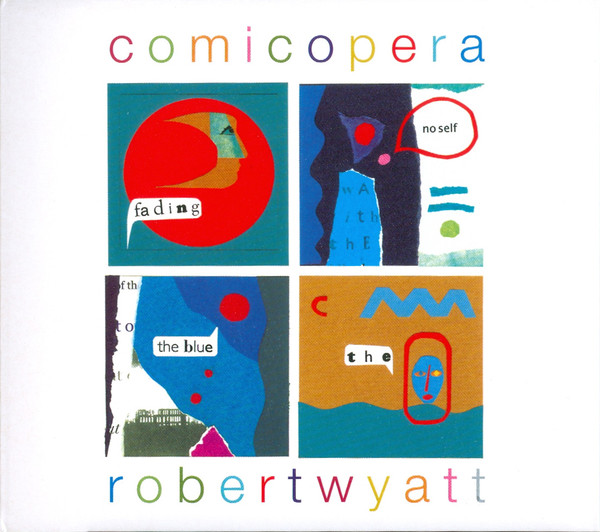Robert Wyatt – Comicopera Domino WIGCD202 (2007)
This is really one of my most-listened-to albums. Wyatt is really at his best here, from his vocals, to his songwriting and song selection, to the instrumentation and arrangements. The album opens with a rendition of Anja Garbarek‘s “Stay Tuned,” which makes an appropriately diffuse and abstract introduction. “Just as You Are” is my absolute favorite Wyatt track. It is a very succinct statement of Wyatt’s politics, which I happen to entirely agree with. I guess some might hear it as a love song though. It works either way. On the song “A Beautiful Peace” Wyatt recounts a walk around town — though Wyatt is partially paralyzed and confined to a wheelchair. While the lyrics note such things as garbage passed by on the street, Wyatt has a way of making that endearing! Later on the song is counterposed with the charmingly ironic “A Beautiful War.” The selection of material written by others in the last part of the album, “Act Three: Away With the Fairies,” speaks volumes. “Del Mondo” is a cover of a song by Consorzio Suonatori Indipendenti (translation: Consortium of Independent Players), a spin-off of the band CCCP Fedeli alla linea (translation: CCCP [Union of Soviet Socialist Republics] Faithful to the Line). “Cancion de Julieta” is an adaptation of poetry by Federico García Lorca, who was murdered by fascists during the Spanish Revolution. «¡Hasta siempre, Comandante!» (translation: “Until Always, Commander”) is cover of a song about the Cuban Revolution, written by Carlos Puebla as a tribute to Che Guevara. There is a lot of political content in this album. Yet in the best possible way it is scarcely noticeable (unlike the more starkly severe Mid-Eighties). Much of the political left has given up the fight, but certainly not Wyatt. He even opens the album with a song featuring the lyrics, “stay tuned / there is more to come”!
The sonic fabric of the album is very much in the same vein as Cuckooland but more developed and effective. Wyatt plays trumpet, cornet, keyboards, and other assorted instruments in a way that is dissonant and “jazzy” yet always within a definite song structure. Occasionally people talk about jazz musicians playing “inside” and “outside” at the same time, and Wyatt seems to do just that in a pop context. It was great that when curating the 2009 Meltdown Festival Ornette Coleman selected Wyatt to perform, along with The Plastic Ono Band, Patti Smith and others. Both men has a knack for making totally unique yet inviting music.
There really is no other musician alive who sounds quite like Robert Wyatt. It is not just that his voice is distinctive. Though it is. It is really his entire approach to music. There is an old debate among leftists about the role of culture, like music. Some hold that proletarians should be the heirs of bourgeois culture, which really places things like Euro-classical music above things like folk or popular music but says that the lower classes will seize control of those cultural forms for the benefit of all. Others hold that proletarian folk/popular art should displace elitist art, and that “high” culture should be abolished. Wyatt represents a kind of hybrid of these views. He works with jazz and pop music elements, but with a sophistication that rivals any highbrow Euro-classical music.
I do think I will continue to listen to this a lot. It hardly seems possible to tire of music this richly varied yet casually welcoming, this deeply heartfelt yet carefully executed.

